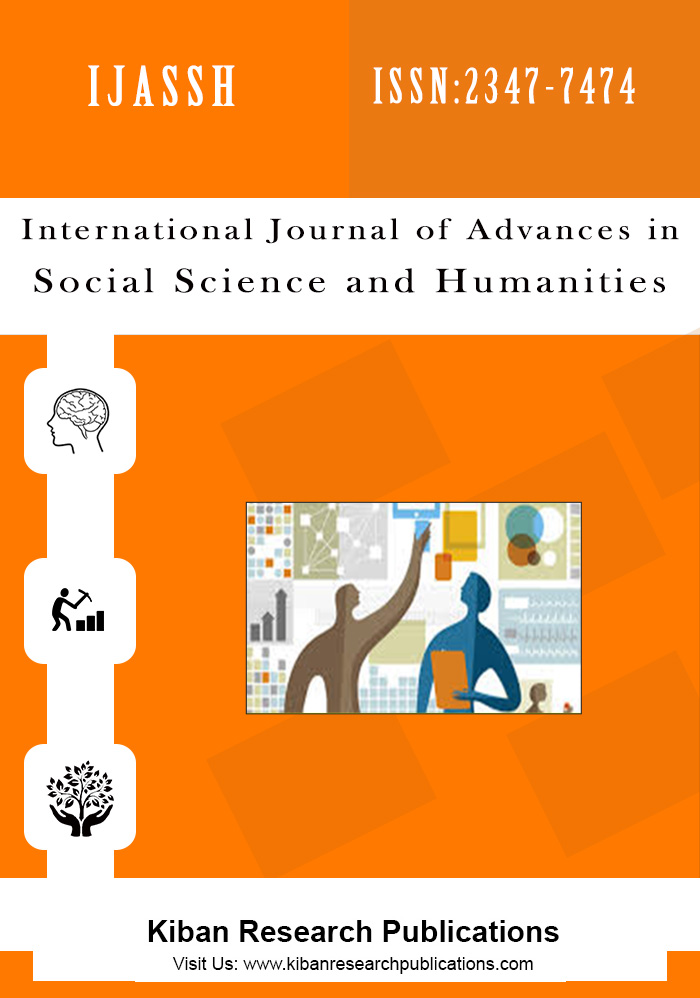THE IMPACT OF GLOBALIZATION ON DEVELOPING COUNTRIES: A LITERATURE REVIEW
Keywords:
Globalization, Benefits, Draw backs, Developing countries.Abstract
The concept, globalization is a multi-dimensional and multifaceted process that encompasses the dimensions of political, economic, social and cultural that have been variously explained in different terms and settings. Globalization might bring new opportunities to developing countries such as greater access to global markets, accelerate technology transfer from more developed countries, holds out promise improved productivity and increased efficiency. However, globalization has also thrown up new challenges to developing countries like volatility in financial market, abuse of labour, environmental degradation's, etc. The debates on the benefits of globalization are fierce. The purpose of this systematic review work was to explore and discuss the benefits and drawbacks of globalization on developing countries in multiple fields such as economic and trade processes, education, health systems, cultural effects, political effects and etc. To achieve this purpose, the reviewer used different inclusion and exclusion criteria and selected only 23 published articles, which were published in between 2005 to 2022. The findings of this study exposed that globalization had both positive and negative impacts on the developing countries. So, nations’ governments, businesses, individuals and private and public organizations throughout the world need to take the initiatives and responsibility to manage globalization by creating treatises and agreements to produce mutually beneficial solutions, to minimize the harms and maximize the opportunities and benefits of globalization on the developing countries. As a limitation, this study did not cover all the dimensions of the impact of globalization on developing countries.
JEL Classification: M10, M20, M31
References
Akinsola, A.O. (2019), “Impacts of globalization on African culture: The Nigerian example”, Globalization, Vol. 42, pp. 43.
Ali, S. (2005), “The influence of globalisation on the national education policies of developing countries”, Journal of Educational Research, Vol.8 No.1, pp. 14.
Aslam, M. H. and Azhar, S. M. (2013), “Globalisation and development: Challenges for developing countries”, International Journal of Economic Policy in Emerging Economies, Vol.6 No. 2, pp. 158-167.
Awuah, G.B. and Amal, M. (2011), “Impact of globalization: The ability of less developed countries'(LDCs') firms to cope with opportunities and challenges. European Business Review”, Vol. 23 No.1, pp.120-132.
Bortz, J., Doring, N. Forschungsmethoden und Evaluation für Human-und Sozialwissenschaftler. In Research Methods and Evaluation in Human and Social Sciences, 4th ed.; Springer: Berlin/Heidelberg, Germany, 2006.
Denyer, D. and Tranfield, D. (2009), Producing a systematic review. In D. A. Buchanan & A. Bryman (Eds.), The Sage Handbook of Organizational Research Methods (pp. 671–689). Sage Publications Ltd.
Fink, A. (2019), Conducting research literature reviews: From the internet to paper. Sage publications.
Gupta, S. (2022), Has Globalisation Hurt or Helped Developing Nations.
Hamdi, F.M. (2013), “The impact of globalization in the developing countries”, Developing Country Studies, Vol. 3 No.11, pp. 142-144.
Hartungi, R. (2006), “Could developing countries take the benefit of globalisation?”, International Journal of Social Economics, Vol. 33 No.11, pp. 728-743.
Ibrahim, A. A. (2022), The impact of globalization on Africa. In The Impact of Globalization on Africa: Ibrahim, Alhaji Ahmadu. [Sl]: SSRN.
Islam, M. S. B. and Mukit, M. M. H. (2019), “Globalization: Blessing or curse for the economy of the developing countries”, International Journal of Science and Business, Vol. 3 No.1, pp. 29-36.
Lee, E. and Vivarelli, M. (2006), “The social impact of globalization in the developing countries”, Int'l Lab. Rev., 145, 167.
Lere, I. (2014), “Globalization and development: The impact on Africa; A political economy approach. OIDA International journal of sustainable development, Vol. 7 No.9, pp. 153-162.
Majekodunmi, A. and Adejuwon, K. D. (2012), “Globalization and African political economy: The Nigerian experience”, International Journal of Academic Research in Business and Social Sciences, Vol. 2 No.8, pp. 189.
Mamman, A. and Baydoun, N. (2009), “Managerial perspective on the impact of globalization in an African commercial bank: Implications for strategy implementation”, International Journal of Organizational Analysis, Vol.17 No.3, pp.184-201.
Meredith, J. (1993), “Theory building through conceptual methods”, International Journal of Operations & Production Management, Vol. 13 No.5, pp. 3-11.
Mikail, I. K. and Abdullah, A. I. L. (2017), “The impact of globalization on African culture and politics”, Journal of International Studies, Vol. 13, pp.1-14.
Moazzam, M. S. R. (2022), “Globalisation and Its Impact on developing countries: Challenges and opportunities. Harf-o-Sukhan, Vol. 6 No.1, pp. 368-376.
Precious, O. U. (2010), “Globalization and the future of African culture”, Philosophical Papers and Reviews, Vol. 2 No.1, pp.1-8.
Sharma, N. K. (2013), “Globalization and its impact on the third world economy”, Crossing the Border: International Journal of Interdisciplinary Studies, Vol. 1 No.1, pp. 21-28.
Stallings, B. (2001), Globalization and liberalization: The impact on developing countries. ECLAC.
Sufian, F. and Kamarudin, F. (2016), “The impact of globalization on the performance of Banks in South Africa”, Review of International Business and Strategy, Vol. 26 No.4, pp. 517-542.
Takiyar, A. and Rao, N. V. M. (2020), “Impact of globalization on human rights: Evidence from Sub-Saharan Africa”, International Journal of Social Economics, Vol. 47 No.12, pp. 1453-1480.
Ugbam, O. C., Chukwu, B. and Ogbo, A. (2014), “The effects of globalization on African culture: The Nigerian perspective”, IOSR Journal of Business and Management, Vol.16 No.4, pp. 62-71.
Published
How to Cite
Issue
Section
Copyright (c) 2024 Engida Anjulo Biru, Chalchissa Amentie

This work is licensed under a Creative Commons Attribution 4.0 International License.




